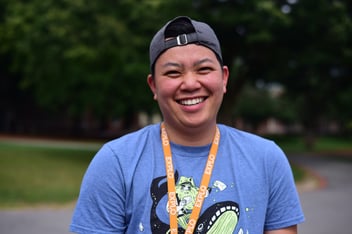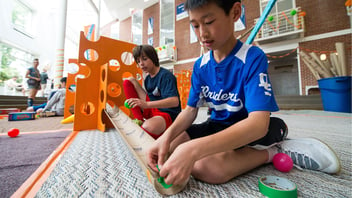Playful Learning at EXPLO
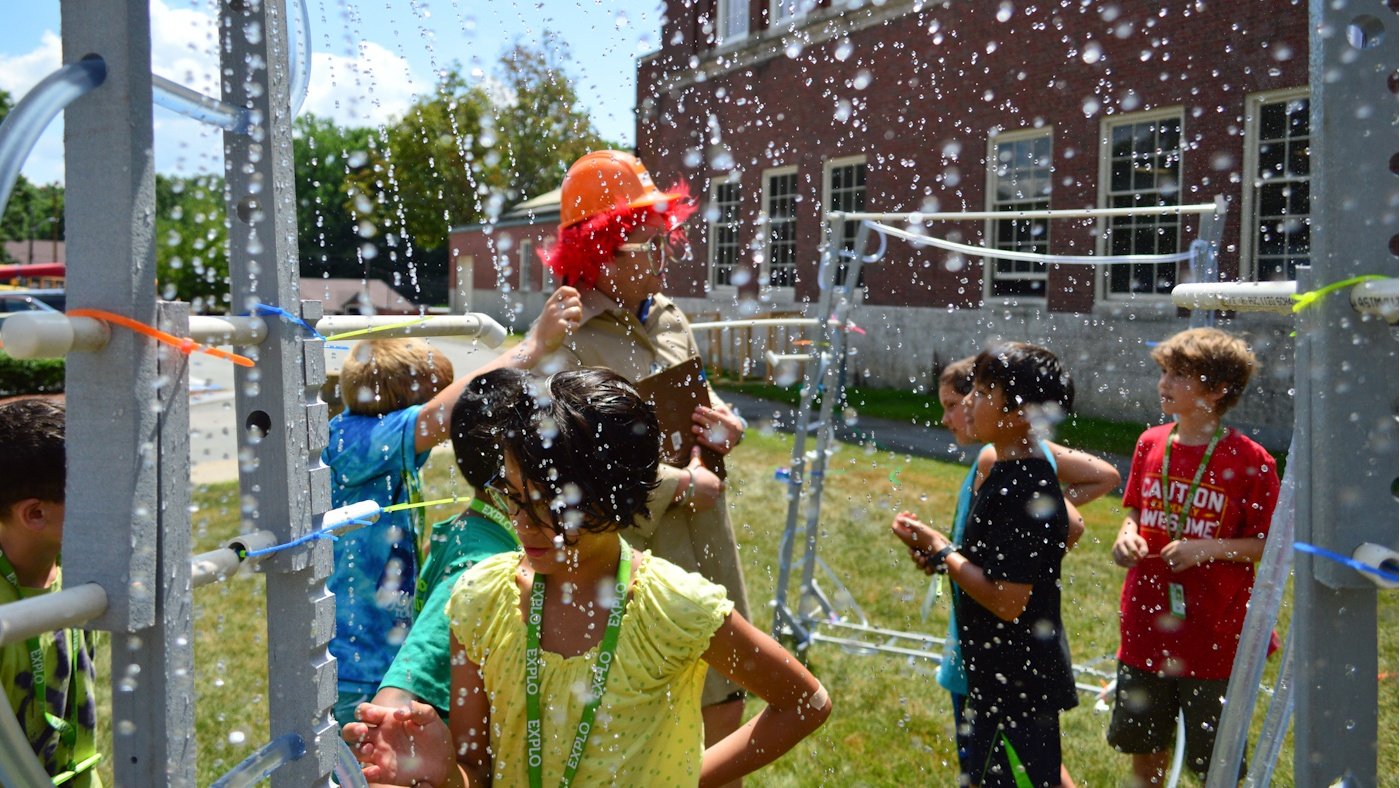
What if we gave ourselves permission for a radical shift in the way we thought about learning? What if we flipped the binary of a “teacher/student” relationship on its head, and instead accepted that we are all learners engaged in the playful pursuit of discovery?
This “Age of Anxiety” is characterized by volatility, uncertainty, complexity, and ambiguity.
The need for this radical shift in our thinking about how we teach and learn comes from the top down. As the technological pace of our society propels us forward, we are entering a period of unpredictability. This “Age of Anxiety” is characterized by volatility, uncertainty, complexity, and ambiguity. As computers replace human beings in their ability to rapidly compute and manufacture, the demand for the workforce is changing.
There is a renewed call for creativity, adaptiveness, and collaboration — for human beings to tap into their innate human ability to be imaginative, flex their emotional intelligence, think critically, and work with others to transform the world. Here at EXPLO, we are prepared to answer that call.
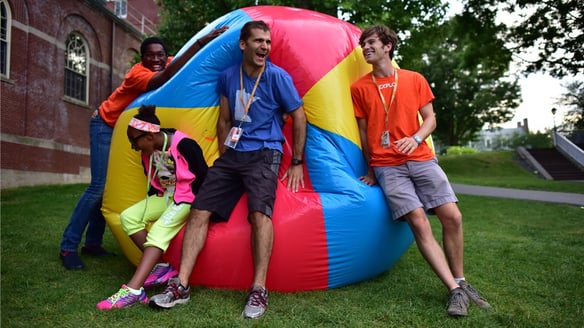
Deep Diving into Exploration
In most cases, the idea of uncertainty in any situation sends people into a frenzied panic. How do we prepare kids for this uncertain future? The answer is more simple than you think, and it’s something we are all fluent in — play. With play, our brains are open to the unexpected. Play inherently fosters a child’s innate creativity and encourages them to push past their boundaries.
“If we can create a learning environment with a low threat (no grades or tests, for example, that your body and mind may perceive to be a threat) and lots of play, there is a significant improvement in the way we are able to interact with new material. We start to associate joy with learning rather than fear with learning,” says David Torcoletti, Head of EXPLO at Wheaton.
With play, our brains are open to the unexpected. Play inherently fosters a child’s innate creativity and encourages them to push past their boundaries.
When we begin to incorporate play into the curriculum of our classrooms, worlds expand. In play, kids learn cognitive flexibility — considering multiple ways of solving a problem with an open mind. Students learn not to take themselves too seriously. They take risks, make quick decisions, and allow for mistakes. They are fully engaged in the act of “doing,” and they are also learning how to reflect upon their experience, how to grow from a mistake, and how to learn from each other. They learn empathy
When they exercise this learned empathy through the act of play, we teach our EXPLO students to build emotional intelligence.
“As we learn to develop our voices in different courses or workshops, there are choices we make to alter, diminish, or lift up the voices of others. At EXPLO, you start to see the world as a place that gets challenged by many events, and with playful learning, we can practice our responses to those events,” Torcoletti says.
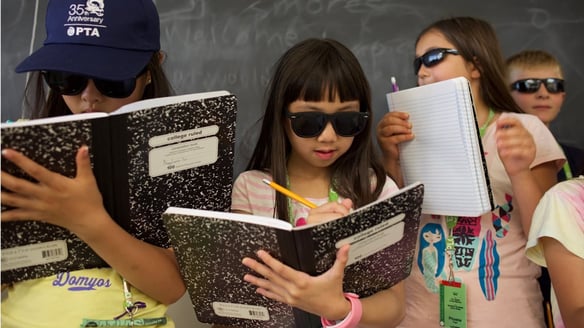
Courses + Electives at EXPLO
At EXPLO, playful learning is one of our core values. We see the joy and possibility that is present when a child is not inhibited by a fear of being measured, but is free to create. Whether it’s our Explorers creating a cardboard carnival from their own design or our Voyagers building an island nation, play in the EXPLO classroom propels students towards discovery. They gain a deeper understanding of the related curricular content, and metacognitively, they reflect on their own approach to learning.
In “Creative Problem Solving,” students play with different approaches to engineering and design, pushing the impossible design challenge towards possible. With “Commercial Illustration,” play becomes an art form as students work to attract “consumers” to their product in artistic ways.
For students with alternative learning styles, we’ve found play to be an especially persuasive form of engagement. It’s like learning in disguise. Playful learning takes the pressure off.
"For students with alternative learning styles, we’ve found play to be an especially persuasive form of engagement,"Jacobi says. “It’s like learning in disguise. Playful learning takes the pressure off. For a student who has struggled in traditional school environments, this feels uniquely different, so the pressure of finding success somewhere you haven’t been able to find success before is gone.”
With play, students tap into different parts of their brain and body that lead them to new ways of approaching a problem. That kid that struggles to sit still and take a test might have just the idea her group needs to unlock the key to hidden treasure.
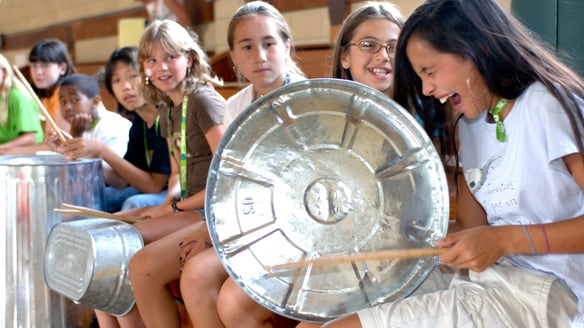
"Students are engaged with material if they are having fun, but we’ve learned that they are the most engaged when they are doing something that is hard and fun at the same time. In the mid-80s, Seymour Papert, founder of the MIT Media Lab Lifelong Kindergarten Project, coined a term to describe this sensation. He called it “hard fun.”
Hard fun describes that eureka moment of blissful discovery at a problem that was truly stumping you. In this pivotal learning moment, it’s not about getting the “right” answer. It’s about feeling empowered that you wrestled with, persevered, and unlocked something that was challenging. As Jacobi says: “In this moment, you have accessed something new. You went a step farther than you’ve ever gone before.”
With Play, Every Moment is a Learning Moment
Every moment is a learning moment at EXPLO. We refuse to put up classroom walls that delineate a place of learning from a place of play because they should both be happening simultaneously. Our years of experience in creative education, our knowledge of the developmental makeup that characterizes our students, and our dedication to constant innovation places EXPLO at the forefront of progressive teaching and learning, and schools and educators are reaching out to us to help them engage their students in this work.
So, it’s time to start playing. Seriously.

